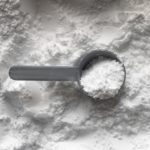Creatine is a naturally occurring compound found in small amounts in foods such as meat and fish. It is also available as a popular dietary supplement used by athletes and fitness enthusiasts to enhance performance and support muscle growth. In this article, we will delve into the science behind creatine, discuss appropriate dosages, and explore the pros and cons associated with its use.
How Creatine Works
Creatine plays a vital role in energy production, particularly during high-intensity, short-duration activities such as weightlifting or sprinting. It functions by increasing the availability of adenosine triphosphate (ATP), which is the primary source of energy for muscle contractions.
When creatine is ingested, it enters the bloodstream and is transported to muscle cells. Within the muscle cells, creatine combines with phosphate molecules to form phosphocreatine (PCr). During intense exercise, ATP is rapidly broken down to release energy. However, ATP stores are limited and can be quickly depleted.
Here is where phosphocreatine comes into play. PCr donates its phosphate molecule to ADP (adenosine diphosphate), converting it back into ATP, thus replenishing the energy stores. This rapid regeneration of ATP allows for sustained energy production and aids in delaying fatigue during high-intensity activities.
Dosage and Loading Phase
The standard protocol for creatine supplementation involves two phases: loading and maintenance. During the loading phase, athletes typically take a higher dose of creatine to saturate their muscles with the compound. The maintenance phase follows, where a lower dose is taken to maintain the elevated creatine levels in the muscles.
- Loading Phase:
- Loading typically involves consuming 20-25 grams of creatine per day for 5-7 days.
- This higher dosage helps rapidly increase muscle creatine stores.
- It can be divided into 4-5 equal doses throughout the day for better absorption.
- Liquid forms or powders mixed with fluids are commonly used for convenience.
- Note: Many feel the loading phase is an outdated concept and can be skipped. Instead a dose of 5g per day is taken.
- Maintenance Phase:
- After the loading phase, the maintenance dose is typically 3-5 grams per day.
- This dosage is sufficient to sustain elevated muscle creatine levels.
- It can be taken in a single dose or divided throughout the day.
It is important to note that not all individuals require a loading phase, as some may achieve optimal muscle creatine levels without it. However, for those who choose to load, it is advisable to consult with a healthcare professional or a registered sports dietitian to determine the most appropriate dosage and duration based on individual needs and goals.
Pros of Creatine Use
- Increased Muscle Strength and Power:
Creatine supplementation has consistently demonstrated its ability to enhance muscle strength and power. It is particularly beneficial for activities that require short bursts of intense energy, such as weightlifting or sprinting. By replenishing ATP stores, creatine allows athletes to perform at higher intensities and maximize their power output. - Improved High-Intensity Performance:
Creatine has been shown to enhance performance in high-intensity, short-duration activities. It helps delay fatigue, allowing athletes to push harder and train or compete at a higher level. This benefit is especially valuable for athletes involved in sports like sprinting, jumping, or weightlifting. - Increased Muscle Mass:
Creatine has been associated with an increase in muscle mass. By improving the body’s ability to perform high-intensity exercise, it stimulates muscle protein synthesis and promotes muscle growth. This can be beneficial for athletes seeking to build lean muscle mass and improve their overall body composition. - Faster Recovery:
Creatine supplementation has shown potential benefits in reducing muscle damage and inflammation, thus aiding in the recovery process. This can enable athletes to recover more quickly between training sessions or competitions, leading to improved overall performance.
Cons of Creatine Use
- Water Retention and Weight Gain:
One common side effect of creatine supplementation is water retention, which can lead to temporary weight gain. This is primarily due to increased water content in the muscles and not fat accumulation. While the weight gain is usually mild, it may be a disadvantage for athletes participating in sports with weight classes or those focused on maintaining a specific body weight. - Gastrointestinal Distress:
Some individuals may experience gastrointestinal issues, such as bloating, cramping, or diarrhea when taking this supplement. These side effects are generally mild and temporary, but they can be uncomfortable and impact training or competition performance. Staying hydrated and spreading the dosage throughout the day may help minimize these effects. - Individual Variations in Response:
The effects of creatine supplementation can vary among individuals. While many athletes experience significant benefits, some may not respond as effectively or may not experience any noticeable improvements. Factors such as genetics, training status, diet, and individual biochemistry can influence the response to creatine supplementation. - Potential Health Concerns:
When used within recommended dosages, it is generally considered safe for most individuals. However, there are potential health concerns associated with long-term or excessive use. These include kidney stress, liver dysfunction, and electrolyte imbalances. It is crucial to follow recommended dosages and consult with a healthcare professional or a registered sports dietitian before starting creatine supplementation, especially if you have pre-existing health conditions.
Creatine supplementation can offer several benefits for athletes, including increased muscle strength, improved high-intensity performance, increased muscle mass, and faster recovery. However, it is important to consider the potential drawbacks, such as water retention, gastrointestinal distress, individual variations in response, and potential health concerns. Before incorporating it into your regimen, consult with a healthcare professional or a registered sports dietitian to ensure it is suitable for your specific needs and to determine the proper dosage and duration. Additionally, choose high-quality creatine supplements from reputable sources to ensure safety and effectiveness.
Need some help with your fitness and nutrition? Alpha Expat can help you reach your fitness and nutrition goals with unique solutions. Reach out to us and get to ball rolling or click on the WhatsApp button in the lower right corner.



